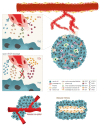Anti-Angiogenic Therapy: Current Challenges and Future Perspectives
- PMID: 33916438
- PMCID: PMC8038573
- DOI: 10.3390/ijms22073765
Anti-Angiogenic Therapy: Current Challenges and Future Perspectives
Abstract
Anti-angiogenic therapy is an old method to fight cancer that aims to abolish the nutrient and oxygen supply to the tumor cells through the decrease of the vascular network and the avoidance of new blood vessels formation. Most of the anti-angiogenic agents approved for cancer treatment rely on targeting vascular endothelial growth factor (VEGF) actions, as VEGF signaling is considered the main angiogenesis promotor. In addition to the control of angiogenesis, these drugs can potentiate immune therapy as VEGF also exhibits immunosuppressive functions. Despite the mechanistic rational that strongly supports the benefit of drugs to stop cancer progression, they revealed to be insufficient in most cases. We hypothesize that the rehabilitation of old drugs that interfere with mechanisms of angiogenesis related to tumor microenvironment might represent a promising strategy. In this review, we deepened research on the molecular mechanisms underlying anti-angiogenic strategies and their failure and went further into the alternative mechanisms that impact angiogenesis. We concluded that the combinatory targeting of alternative effectors of angiogenic pathways might be a putative solution for anti-angiogenic therapies.
Keywords: VEGF; anti-angiogenic therapy; cancer therapy; drug resistance; neo-angiogenesis; new targets.
Conflict of interest statement
The authors disclose any conflict of interest.
Figures



References
-
- Domingues G., Fernandes S.G., Serpa J. Understand Cancer: Research and Treatment. iConcept Press; Hong Kong, China: 2015. Dynamics of VEGF-A and its Receptors in Cancer Vascularization—An Overview. Chapter 3.
Publication types
MeSH terms
Substances
LinkOut - more resources
Full Text Sources
Other Literature Sources
Medical

